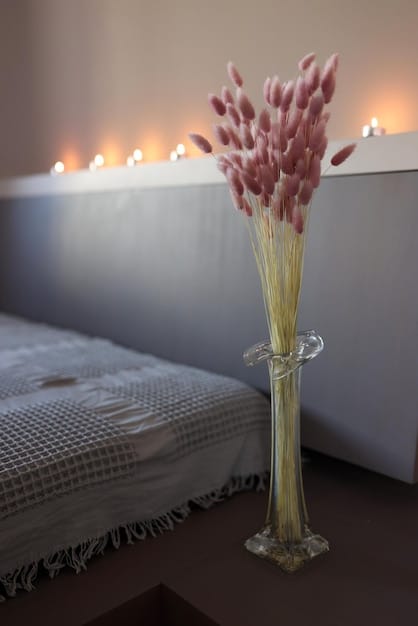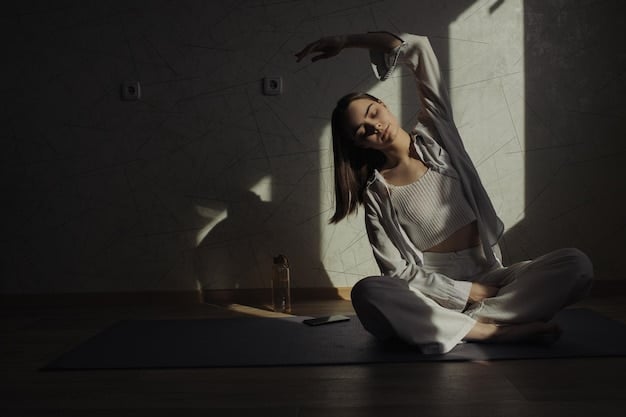Unlock Deeper Sleep: 7-Day Guided Meditation for Insomnia Relief

Unlock Deeper Sleep: A 7-Day Guided Meditation Program for Insomnia Relief is designed to help individuals struggling with insomnia find restful sleep through a structured series of daily meditations, promoting relaxation and reducing anxiety that interferes with sleep patterns.
Struggling to fall asleep or stay asleep? Discover how the Unlock Deeper Sleep: A 7-Day Guided Meditation Program for Insomnia Relief can help you reclaim restful nights and wake up feeling refreshed.
Understanding Insomnia and the Power of Meditation
Insomnia is a common sleep disorder that can make it hard to fall asleep, hard to stay asleep, or cause you to wake up too early and not be able to get back to sleep. It can be acute (short-term) or chronic (long-term). While there are various treatments available, meditation has emerged as a powerful, natural approach to alleviate insomnia symptoms.
Meditation, particularly guided meditation, can calm the mind and relax the body. By focusing on the present moment, you can reduce the mental chatter and anxiety that often keep you awake at night. Let’s explore how meditation can be a game-changer for your sleep.
The Science Behind Meditation and Sleep
Research has shown that meditation can positively impact sleep quality. It works by:
- Reducing stress hormones like cortisol, which can interfere with sleep.
- Increasing melatonin, the hormone that regulates sleep-wake cycles.
- Training the mind to focus and quiet racing thoughts, promoting relaxation.
Types of Meditation for Insomnia
Several types of meditation can be beneficial for insomnia, including:
- Mindfulness meditation: Focusing on the present moment without judgment.
- Body scan meditation: Bringing awareness to different parts of the body, releasing tension.
- Loving-kindness meditation: Cultivating feelings of compassion and kindness towards oneself and others.
Incorporating meditation into your daily routine can pave the way for a more peaceful and restorative sleep. It’s not just about falling asleep faster; it’s about improving the overall quality of your sleep and your well-being.
In conclusion, insomnia significantly impacts sleep quality, and meditation offers a natural approach to alleviate its symptoms by reducing stress hormones and promoting relaxation, ultimately improving sleep patterns.
Preparing for Your 7-Day Guided Meditation Program
Before you embark on the Unlock Deeper Sleep: A 7-Day Guided Meditation Program for Insomnia Relief, it’s essential to create a conducive environment and set realistic expectations. This preparation will help you make the most out of your meditation sessions and increase their effectiveness.
Choosing the right time and place, setting intentions, and managing expectations are key to a successful meditation practice. Here’s how to get started:

Creating a Sleep-Friendly Environment
Ensure your bedroom is dark, quiet, and cool. Use blackout curtains, earplugs, or a white noise machine if necessary. A comfortable mattress and pillows are also crucial for a good night’s sleep.
Setting the Stage
Choose a time each day for your meditation session that fits your schedule. Many people find that meditating before bed is particularly effective for promoting sleep. Clear your mind of distractions by turning off your phone and letting your family know you need some quiet time.
Essential Tools and Resources
While meditation can be done anywhere, having a few tools can enhance your experience:
- Comfortable meditation cushion or chair.
- Headphones for guided meditations.
- A meditation app or pre-recorded guided meditations.
Setting Intentions and Managing Expectations
Before you begin, set a clear intention for your meditation session. This could be to relax your body, quiet your mind, or simply be present in the moment. Remember that meditation is a practice, and it’s normal for your mind to wander. Be patient and gentle with yourself. Don’t expect immediate results; it may take a few days to feel the full benefits.
In essence, preparing for your 7-day guided meditation program involves creating a tranquil environment, setting realistic expectations, and gathering essential tools to enhance your meditation practice, ensuring a more effective and peaceful experience.
Day 1-2: Introduction to Mindfulness and Body Scan Meditation
The first two days of the Unlock Deeper Sleep: A 7-Day Guided Meditation Program for Insomnia Relief focus on introducing you to mindfulness and body scan meditation techniques. These practices are designed to help you become more aware of your thoughts and body sensations, promoting relaxation and reducing mental clutter.
By grounding yourself in the present moment and gently scanning your body for tension, you can begin to unravel the patterns of restlessness that contribute to insomnia. Here’s what you can expect:
Day 1: Mindfulness Meditation
Begin with a simple mindfulness meditation. Find a comfortable position, either sitting or lying down. Close your eyes and focus on your breath. Notice the sensation of the air entering and leaving your body. When your mind wanders, gently guide it back to your breath without judgment. Aim for 15-20 minutes.
Day 2: Body Scan Meditation
Lie down on your back with your arms at your sides and your palms facing up. Close your eyes and bring your attention to your toes. Notice any sensations without judgment. Slowly move your attention up your body, scanning each body part for tension or discomfort. Continue until you reach the top of your head. Spend 20-25 minutes on this practice.
- Focusing on Breath: Direct attention to the breath cultivates mindfulness and anchors the mind in the present.
- Body Awareness: The act of scanning the body uncovers areas of tension, fostering self-understanding and relaxation.
- Non-Judgmental Observation: Approaching thoughts and sensations without criticism promotes acceptance and reduces reactivity.
Mindfulness and body scan meditation are foundational practices for cultivating awareness and relaxation. By integrating these techniques into your routine, you can pave the way for a more restful sleep experience.
In conclusion, during the first two days, you will focus on practicing mindfulness and body scan meditation to enhance your awareness of thoughts and body sensations, which helps in relaxation and reducing mental clutter for improved sleep.
Day 3-4: Cultivating Calm with Breathwork and Visualization
Days 3 and 4 of the Unlock Deeper Sleep: A 7-Day Guided Meditation Program for Insomnia Relief build upon the foundation of mindfulness by introducing breathwork and visualization techniques. These methods are designed to further calm the mind and relax the body, creating a more conducive state for sleep.
Breathwork techniques, combined with visualization, can help shift your focus away from racing thoughts and create a sense of inner peace. Here’s what to expect during these days:

Day 3: Breathwork for Relaxation
Practice the 4-7-8 breathing technique to relax your body and calm your mind. Sit comfortably and exhale completely through your mouth. Close your mouth and inhale quietly through your nose for a count of 4. Hold your breath for a count of 7. Exhale completely through your mouth for a count of 8. Repeat this cycle at least four times. Focus solely on your breath.
Day 4: Visualization for Sleep
Use visualization to create a tranquil mental space. Close your eyes and imagine a peaceful scene, such as a quiet beach or a serene forest. Engage all your senses: What do you see? What do you hear? What do you smell? Allow yourself to fully immerse in this calming environment. Spend 20-25 minutes in this visualization.
These techniques can be particularly helpful when you find yourself struggling to fall asleep due to racing thoughts or anxiety.
- Deep Breathing: Slows heart rate, lowers blood pressure, and induces relaxation through parasympathetic activation.
- Mental Imagery: Provides a mental sanctuary, diverting attention from worries and promoting calmness and positive emotions.
- Sensory Engagement: Enhances the experience of relaxation by intensifying feelings of peace and tranquility.
Breathwork and visualization techniques offer powerful tools for calming the mind and relaxing the body. By incorporating these practices into your sleep routine, you can significantly improve your ability to unwind and drift off to sleep.
In summary, days 3 and 4 involve breathwork and visualization techniques that calm the mind and relax the body, which are beneficial for reducing anxiety and promoting a peaceful state conducive to sleep.
Day 5-6: Addressing Sleep Anxiety with Affirmations and Gratitude
Days 5 and 6 of the Unlock Deeper Sleep: A 7-Day Guided Meditation Program for Insomnia Relief focus on addressing sleep anxiety by incorporating affirmations and gratitude practices. These techniques aim to shift negative thought patterns and foster a sense of peace and contentment, which can significantly improve sleep quality.
By replacing anxious thoughts with positive affirmations and focusing on gratitude, you can cultivate a more relaxed and optimistic mindset, paving the way for restful sleep. Here’s what to expect during these days:
Day 5: Affirmations for Sleep
Use affirmations to counteract negative thoughts about sleep. Repeat positive statements such as “I am safe and relaxed,” “I deserve restful sleep,” or “I release my worries and embrace sleep.” Say these affirmations aloud or silently to yourself before bed and during moments of anxiety. Continually reinforcing these beliefs can help reprogram your mind to associate with positive relaxation-related thought patterns rather than worry and anticipation around not sleeping well enough!
Day 6: Gratitude Meditation
Practice gratitude meditation to shift your focus from worries to the positive aspects of your life. Before bed or during your meditation session, reflect on three things you are grateful for. These can be simple things, such as a warm cup of tea or a kind gesture from a friend. Allow yourself to feel genuine appreciation for these aspects of your life. Spending some time connecting with sincere gratitude leads to the release of serotonin into your brain creating a general positivity bias for the next several hours before sleeping!
- Attitude Shifts: Affirmations and gratitude meditation are designed to positively shift your attitude about sleep, addressing any underlying issues or anxieties that could keep you from falling asleep.
- Reduces Sleep Anxiety: These practices are directly aimed at reducing sleep anxiety and replacing these negative thought patterns with ones that are more conducive to getting rest.
- Enhances Overall Well-Being: These methods address broader issues in your life beyond just sleep, which makes a more holistic approach to tackling the problems associated with insomnia.
Addressing sleep anxiety with affirmations and gratitude practices can lead to a significant improvement in sleep quality. By incorporating these techniques into your routine, you can cultivate a more positive and relaxed mindset, creating a more conducive state for sleep.
In essence, focusing on affirmations and gratitude during days 5 and 6 helps address sleep anxiety by shifting negative thoughts and promoting a sense of peace and contentment, which enhances sleep quality.
Day 7: Integrating Practices and Sustaining Your Sleep Hygiene
The final day of the Unlock Deeper Sleep: A 7-Day Guided Meditation Program for Insomnia Relief is about integrating the practices you’ve learned throughout the week and developing strategies to sustain your sleep hygiene. This day is crucial for ensuring that the benefits of your meditation program extend beyond just one week.
Reviewing your progress, creating a personalized routine, and establishing consistent sleep habits are key to maintaining long-term sleep improvement. Here’s what you can expect on Day 7:
Reflecting on Your Progress
Take some time to reflect on your experience throughout the week. What meditation techniques did you find most helpful? What challenges did you encounter, and how did you overcome them? Documenting your observations and insights can provide valuable guidance as you continue your meditation journey. Reviewing and reflecting can help sustain your plan by identifying and refining areas where you have trouble!
Creating a Personalized Sleep Routine
Based on your experiences, create a personalized sleep routine that incorporates the meditation techniques that worked best for you. This routine could include mindfulness meditation, breathwork, affirmations, or gratitude practices. Experiment with different combinations and timings to find what works best for your individual needs.
Establishing Consistent Sleep Habits
Consistency is key to good sleep hygiene. Go to bed and wake up at the same time every day, even on weekends, to regulate your body’s natural sleep-wake cycle. Avoid caffeine and alcohol before bed, and create a relaxing bedtime routine that signals to your body that it’s time to sleep. For example, turn off devices or put them on nightmode by 8PM in order to create a wind-down cycle.
- Mindful Integration: Combining techniques that resonate strengthens overall practice and promotes sustained results
- Consistency: Sticking to a personalized sleep routine makes sleep hygiene a habit and fosters better night time rest
- Conscientious Environment: Establishing consistent sleep habits and avoiding known sleep disrupters like alcohol and caffeine are crucial
Integrating practices and sustaining your sleep hygiene are essential for long-term sleep improvement. By taking the time to reflect on your progress, create a personalized routine, and establish consistent sleep habits, you can continue to enjoy the benefits of meditation for years to come.
In summary, Day 7 focuses on integrating learned practices, creating personalized routines, and establishing healthy sleep habits to maintain long-term improvements in sleep quality, ensuring the benefits of the meditation program continue beyond the initial week.
| Key Point | Brief Description |
|---|---|
| 🧘 Mindfulness Meditation | Focusing on the present moment can reduce mental chatter. |
| 😴 Body Scan | Releasing tension and discomfort throughout the body. |
| 😌 Breathwork | Calming the mind with the 4-7-8 breathing technique. |
| 🙏 Gratitude | Shifting focus to the positive aspects of life. |
FAQ
▼
Guided meditation is a form of meditation led by a facilitator, either in person or through a recording, that helps individuals focus their mind and relax their body. It can help with insomnia by reducing stress and anxiety, promoting relaxation, and quieting the mind before sleep.
▼
While the optimal duration varies from person to person, aiming for at least 15-20 minutes of meditation each day can lead to noticeable improvements in sleep quality. Consistency is more important than duration, so prioritize regular practice.
▼
Yes, meditation is still possible even if you have trouble sitting still or focusing. Start with shorter sessions (5-10 minutes) and gradually increase the duration as you become more comfortable. You can also try movement-based meditations like yoga or tai chi.
▼
Meditation is generally safe and has few side effects. However, some individuals may experience temporary anxiety or emotional discomfort as they confront suppressed emotions. If this occurs, it’s recommended to seek guidance from a qualified meditation teacher or therapist.
▼
Many people experience some improvement in their sleep within the first week. However, individual results may vary. Consistency is vital and some will achieve notable results after a few weeks. Continue to apply what you’ve learned to maintain and enhance sleep quality.
Conclusion
The Unlock Deeper Sleep: A 7-Day Guided Meditation Program for Insomnia Relief offers a comprehensive approach to improving sleep quality through various meditation techniques. By incorporating these practices into your daily routine, you can reduce stress, calm your mind, and create a more conducive environment for restful sleep.





